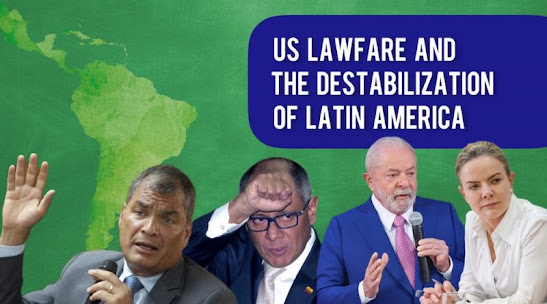“Lawfare is the use of the law as a weapon of war, and it is the newest characteristic of 21st Century Combat,” Colonel Charles Dunlap
Lawfare is the weaponized use of the law to annihilate a political or business enemy. Common tactics used in Lawfare include: forum shopping – when public prosecutors transfer a case to a jurisdiction with a friendly judge; excessive use and abuse of coerced plea bargain testimonies which are often the only evidence presented; suppressing evidence beneficial to the defense; and close collaboration with the media to create a public spectacle. One example of the later tactic is the time Brazilian Java Jato judge Sergio Moro ordered former Economy Minister Guido Mantega to be forcibly removed from his wife’s chemotherapy session and tipped the press off in advance, to create a media circus around his arbitrary arrest on charges he was later ruled innocent of.
There are indications that US DOJ use of Lawfare was piloted in the US before being rolled out through Latin America. In July, 2008, the US Department of Justice (DOJ) announced it was filing corruption charges against Senator Ted Stevens (R/AK) for allegedly receiving illegal reforms on a vacation property, damaging his reputation and causing him to lose his first election in over 36 years. Like future cases in Latin America, there was no material evidence presented, just a coerced plean bargain testimony made by a man who was trying to get out of jail. Months after the election, Stevens was ruled innocent, and in 2012 Judge Emmett Sullivan ruled two DOJ officials guilty of proprietorial misconduct. Nearly all of the tactics cited in the kangaroo court persecution of Ted Stevens would go on to be used against Brazilian President Luiz Inacio Lula da Silva within the ambit of the the US DOJ-backed Lava Jato (Car Wash) investigation. Coincidence or not, it is clear that these tactics would soon be exported throughout the Americas and the World, especially through partnerships with local law enforcement officials within the ambit of the Foreign Corrupt Practices Act (FCPA).
As two members of Lula’s defense team, Cristiano Zanin and Valeska Martins wrote with legal scholar Rafael Valim in their 2021 book Lawfare: Waging War through Law it first appeared as a military term in the 1970s, but gained popularity in a series of texts by US Air force Colonel Charles Dunlap starting in 2001, when he wrote, “Lawfare is the use of the law as a weapon of war, and it is the newest characteristic of 21st Century Combat.”
Originally described as a weaponized use of international human rights law to criticize military campaigns by the US and Israeli governments on human rights issues and to weaken support for things like the war in Iraq, it was alluded to in the in the Pentagon’s March, 2005 National Defense Strategy, which refers to law as “the weapon of the weak who use international legal cases and terrorism to usurp America.”
Soon, however, military strategists began suggesting that Lawfare could be more than just something that the US government had to defend against and that it could also benefit national security, being preferable to expensive and destructive forms of war, and more neutral definitions of the term began to emerge. Dunlap later wrote that Lawfare could be converted into a “strategy of using or misusing law as a substitute for traditional military means to achieve military objectives.” (more...)
US Lawfare and the destabilization of Latin America

No comments:
Post a Comment